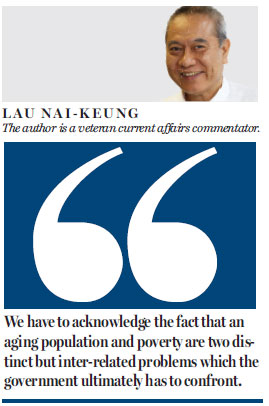Effective retirement protection calls for systemic approach
Updated: 2015-12-30 08:23
By Lau Nai-keung(HK Edition)
|
|||||||
After years of debate, the government has finally released a consultation paper on a retirement protection scheme. The paper features two scenarios known as a universal "regardless of rich or poor" option and a non-universal "those with financial needs" option. The elderly would receive HK$3,230 per month under both schemes. However, for the means-tested option, those eligible would be elderly singles with assets not exceeding HK$80,000 and a monthly income of no more than HK$7,340, and married elderly couples with assets not exceeding HK$125,000 and a combined monthly income of no more than HK$11,830.
The two options obviously have different financial implications. According to the government's estimation, the universal option would cost HK$22.6 billion in 2015, growing to HK$56.3 billion in 2064 and leading to an overall increase in public expenditure of about HK$2.4 trillion over 50 years. On the other hand, the non-universal, means-tested option would only lead to an overall increase in public expenditure of HK$255.5 billion in the same time period. In other words, the means-tested option would cost only one-tenth the amount of the universal version.
How the government came up with the financial forecast is a mystery, though technically speaking the assumptions and formulas were certainly buried somewhere in the consultation paper. Anyway, you do not have to be a genius to know which scheme the government wants the public to support.
Interestingly enough, in order to fund the retirement protection scheme, the government is proposing to hike taxes or introduce new ones, an idea that reminds us of a previous and unfruitful consultation exercise. Listing greater taxation as a possible funding source, knowing the near-zero possibility of its being accepted by the politicians and the general public, seems too grossly negligent to be sincere.
The current cohort of impoverished elderly grew up in the 1930s and 1940s. They are poor because they grew up in the early period of colonial Hong Kong, when times were very harsh, and they were not educated. If future cohorts of elderly find themselves poor, they would be so because of quite different reasons. Instead of wars and social upheavals, they would have the Mandatory Provident Fund (MPF) to blame. They are poor because the government favors capital so much that it hurts the labor force.
In a sense, the current consultation is an admission of the MPF's failure. A properly designed mandatory pension scheme should be able to adequately cover everyone who has worked a sufficient number of years in their prime. They should be able to receive a monthly pension, the size of which varies to reflect what they earned when employed but with a minimum amount set to guarantee a decent livelihood in old age, which can also be combined with other social security provisions.
Public demand for a better retirement protection scheme suggests that our values have changed. The current cohort of elderly ran from the war and came to Hong Kong for shelter. The concept of welfare was alien to them. That is why many would rather salvage recyclable trash than go to the government. Believe me, later cohorts of elderly will not be doing that.
This requires us to rethink our overall approach to the redistribution of wealth. Some point out that Article 108 of the Basic Law asks us to take "the low tax policy previously pursued in Hong Kong as reference". They then remind us that Article 107 of the Basic Law states: "The Hong Kong Special Administrative Region shall follow the principle of keeping expenditure within the limits of revenues in drawing up its budget."
Taken together, these two articles can be construed to resist any change. However, we should note that the low tax policy previously pursued is merely a "reference". And while it is common sense that in the long run one should not and cannot spend more than one earns, it does not mean that we cannot draw up a budget deficit in the short run to achieve specific objectives. The lesson here is that we have to approach this issue in a systemic manner. In order to design an effective solution, we have to acknowledge the fact that an aging population and poverty are two distinct but interrelated problems which the government ultimately has to confront.

(HK Edition 12/30/2015 page9)